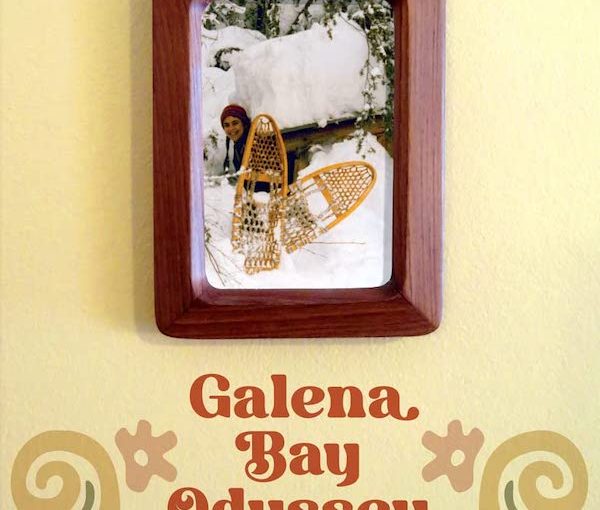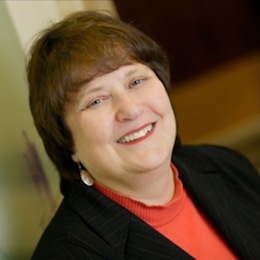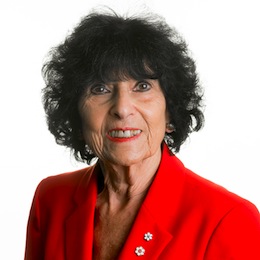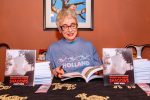Janet Wees at a book signing for her
novel When We Were Shadows, which
she’ll be bringing to the Cherie Smith JCC Jewish Book Festival on Feb. 10. (photo
by Jack Cohen)
Ze’ev Bar was 5 years old in 1937, when his
family fled Germany to the Netherlands, where they lived in safety for a few
years. But, in 1940, as the Nazis extended their hold on Europe, the family had
to go into hiding, managing to survive the Holocaust with the help of members
of the Dutch Resistance.
Calgary-based educator and writer Janet Wees
tells Bar’s story of survival in the book When We Were Shadows. She will
present the novel for younger readers (ages 9-13) on Feb. 10, 10 a.m., at the
Jewish Community Centre of Greater Vancouver as part of the Cherie Smith JCC
Jewish Book Festival, which runs Feb. 9-14. Wees and five other authors – Leo
Burstyn, Miriam Clavir, Arnold Grossman, David Kirkpatrick and Helen Wilkes –
will briefly introduce their works at the event A Literary Quickie.
“My reasons for writing this book were
twofold,” Wees told the Independent. “One, to help relieve Ze’ev from
having to repeat his story over and over to schoolchildren because it was so
upsetting for him, yet he felt it needed to be told so they would know what
happened during the Second World War in their country. Hopefully, having had
the book translated into Dutch in Holland, that might be happening. I have had
letters from mothers of children who are reading the book in Dutch for book
reports.
“My other reason was to expose North American
children to the plight of children during war, to the bravery of the people who
helped save lives at risks to their own.”
Among the real-life members of the resistance featured in the novel are Opa Bakker, Tante Cor, and Edouard and Jacoba von Baumhauer, all of whom have been recognized as Righteous Among the Nations by Yad Vashem. Wees said, “I made a promise to von Baumhauer’s son that I would honour the people who risked their lives helping to build the Hidden Village [near Vierhouten] and hide, assist and feed the people who were fleeing the Nazis.”
Wees visited the memorial site of the Hidden
Village in 2005, and again in 2007. She interviewed Bar in Amsterdam in 2008.
“We spent three to four days in his dining
room, talking, crying, laughing; I taped and wrote,” she said. “Once home, I
poured it all out on computer and began to sort and edit and change, and
watched it take shape. Of course, life interfered, and sometimes it was so
intense, hearing his wavering voice on tape, that I would have to take a break.
By 2011, it felt ready for an editor. After that, I submitted it, naively
giving myself 12 rejections – apparently J.K. Rowling had 12 rejections before
Harry Potter was accepted – before I reconsidered my direction.”
A change in direction did occur. In 2014, Wees
was accepted into a mentorship program and, with that guidance, realized that
the novel “needed a boy’s voice and an empathetic setting, where children could
identify with the protagonist.”
Over some four months, Wees said, “I
essentially rewrote the book using a different format and incorporating a boy’s
voice. At the end, there was a reading and the book was so enthusiastically
received that I knew I was on the right track.
“It felt like I had kind of lost perspective,
as I was so close to the story and, even though I would have times of ‘Wow! Did
I write that?’ seeing it through others’ eyes really gave me a boost. I began
submitting again and, this time, the 11th publisher contacted was the one!”
The book was accepted by Second Story Press in
2017.
“I always wanted Second Story Press to be my
publisher because of their Holocaust Remembrance Series for Young Readers. I
read other books in that series and felt this was a good fit,” said Wees.
While When We Were Shadows is Wees’
first book, she has published articles in educational journals and in news
magazines. In addition to other literary projects, she has written drafts for
two children’s books, she said, “based on something I did growing up in
Saskatchewan, and one based on my pen pal’s granddaughter’s activity with her
Oma in Holland.”
The 60-something Wees first started writing her
pen pal when she was 12 years old.
“My pen pal Henk had to find a pen pal in an
English-speaking country for his English class in school. He put an ad for a
pen pal in the Regina Leader-Post and I saw it and responded,” she
explained. “He told me, on my first visit, as we were looking over all my
letters he’d saved, that my letter was the funniest so he chose me as his pen
pal.
“We wrote constantly but lost contact for a few
years during which we both got married and started families. I reconnected, in
1972 or thereabouts, and, knowing how families in Europe usually stay in their
family homes, I wrote to the old address. Lo and behold! There they were! After
that, it was letters with Henk’s wife because she was better at that point with
written English, but we telephoned and, upon the onset of computers, we emailed
and then FaceTimed.
“I went to visit them for the first time in
1991, and have been back 10 times since…. On one of the trips where I stayed
one month on the island (Terschelling), Hennie (Henk’s nickname) and Loes took
me to see the memorial site of the Hidden Village and the urge to learn more
about this site was palpable.
“Two years later,” said Wees, “we went again,
and I sat for longer in the replica huts and tried to imagine what went on. It
smelled like our dirt basement in Togo, Sask., and just thinking about living
in that basement for 18 months gave me a bit of an idea of the sense of being
confined; the smells, the dark, the cold. And I decided that I had to write a
book, if not for my former students who were now in university, for their
children. Sadly, Hennie passed away this past April without seeing the
published book, but I used his name (with his permission) for one of my
characters, so he lives on through the book. If not for him, this book may
never have existed.”
In their first discussions about the novel,
Wees said she and Bar had “talked about making it an ‘adventure’ of a boy
during wartime.” The original title was Boy of the Forest. “But,” she
said, “as I was writing, I realized this was not an ‘adventure’ as we perceive
adventure, and he concurred, so I changed my title to Whatever It Takes.
My publisher chose the final title, When We Were Shadows, and I love
it because it personifies the whole concept of living in the shadows – unseen,
and unable to see.”
In revising the original manuscript to be from
a young boy’s perspective, she said her focus was on “the emotional being of
Walter [Ze’ev changed his name as an adult] and how he perceived what was
happening, being sheltered and wanting desperately to know and to do something,
and about the selflessness of others. I wanted it to be about the people in his
world, what was happening inside his head and heart, more than what was
happening outside.”
Wees said the character of Walter took over
“and his voice flowed through so eloquently and so quickly that there were many
days I never budged from my computer for hours, missing lunch and working until
dark. I ‘heard’ him in my head. I could ‘see’ what was happening. Until I
actually was writing, I always thought that was bunk when I heard other authors
say that their characters take them on their own journey. But now I know it
happens.
“I also discovered that what I’d taught my
students about editing, I had to follow as well, so I did most of my editing by
reading the book aloud. I found errors that way in facts, such as tents not
having zippers in the 1940s but pegs instead. I was able to find correct
weather for dates in the letters by searching online.”
This diligence no doubt contributed to When
We Were Shadows being nominated for the Forest of Reading Red Maple
non-fiction award of the Ontario Library Association, which describes the award
program’s aim as getting young readers (ages 12 to 13) to engage “in
conversation around the books and … to use critical thinking while reading.”
The awards will be presented in May.
In the writing of When We Were Shadows,
Wees said, “I have become friends with von Baumhauer’s grandson and wife. While
writing this book, I also found out that my grandmother lost sisters-in-law to
the death camps and her brother was killed on the Russian front. Until then, I
had no idea how our family was affected by the Holocaust, as I was unaware of
family still living overseas. I am now in touch with the great-granddaughter of
one of those women.”
For the full book festival schedule and tickets, visit jewishbookfestival.ca.
Friendship
interrupted
The Princess Dolls by Ellen Schwartz,
with illustrations by Mariko Ando, takes place in Vancouver in 1942. Esther and
Michiko are best friends. They dream that one day they will be princesses
together; in games, Esther is Princess Elizabeth and Michi is Princess
Margaret. When they spy dolls fashioned after the real-life princesses in the
toy store window, the girls dare to hope that they’ll each get their favourite for
their birthday, something else they shared, both having been born on the same
day.
However, when Esther gets her royal doll as a
gift, but Michi doesn’t, the girls’ friendship is strained. Before they have a
chance to patch it up, Michi and her family – ultimately along with more than
21,000 other Japanese-Canadians – are forced to leave the West Coast, losing
their home, business and possessions. Michi ends up in Kaslo, B.C.
A story thread throughout The Princess Dolls
is Esther’s family’s worry over family members in Europe, as the Nazis round up
Jews and send them to transit camps, about which Esther’s parents and
grandmother know little.
The Princess Dolls is kind of a companion novel to Schwartz’s Heart of a Champion, in which 10-year-old Kenny Sakamoto dreams of being as good at baseball as his older brother, who is the Asahi team’s star player. Also set in Vancouver in 1942, the Sakamoto family’s neighbours and good friends, the Bernsteins, are Jewish. As she told the Independent when that book was released, “I wanted to point out that the treatment of Japanese-Canadians, although obviously not nearly as lethal or horrific, was comparable to that of Jews in Europe,” said Schwartz. “In both cases, a minority was being persecuted simply because of their religion or nationality. Giving Kenny a Jewish best friend would make both characters sympathetic about this issue.” (See jewishindependent.ca/uniquely-b-c-baseball-story.)
Schwartz will talk about The Princess Dolls on Feb. 10, 11 a.m., at Richmond Public Library, as well as at Vancouver Talmud Torah later that week as part of the Cherie Smith JCC Jewish Book Festival. For the festival schedule and tickets, visit jewishbookfestival.ca.
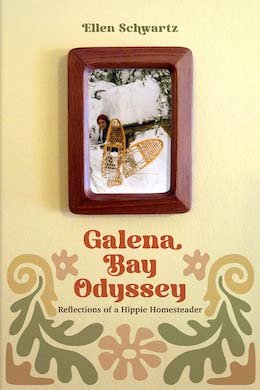 Schwartz’s unique history encapsulates the overarching idealism of many in her generation. Her grandparents were “impoverished Jewish immigrants who had fled the hardships and pogroms of Lithuania and Poland” to give their kids a better life in the United States, so their grandchildren also were well set up for material success. The grandchildren – Schwartz and her peers – had an idea but no real understanding of the sacrifices that had been made to achieve the comfortable lifestyle they rejected, because of the racial and social inequality they saw around them, the environmental degradation and the war in Vietnam.
Schwartz’s unique history encapsulates the overarching idealism of many in her generation. Her grandparents were “impoverished Jewish immigrants who had fled the hardships and pogroms of Lithuania and Poland” to give their kids a better life in the United States, so their grandchildren also were well set up for material success. The grandchildren – Schwartz and her peers – had an idea but no real understanding of the sacrifices that had been made to achieve the comfortable lifestyle they rejected, because of the racial and social inequality they saw around them, the environmental degradation and the war in Vietnam.
